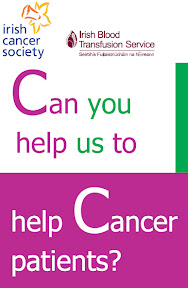What do you mean, what's my job?
Oh, right. Well, that's fair, I spose! I'm currently with Vodafone Ireland working on their mobile portal. You know. The interweb on your phone. When you click the little red button on your Vodafone phone, like. Well I help do that.
Anyways, one of the great things about it is that I get to work on doing interesting things in a new way - bringing things to people's attention that they may not otherwise have known about.
The whole mobile web (thanks in part to people like Pat Phelan) is certainly an interesting area to be working in. It's bringing information to people in a way they've never had it before.
Like the current Platelet donation campaign taking place for the Irish Blood Transfusion Board and the Irish Cancer Society. Jazzbiscuit has also highlighted it.

Can you help with a platelet donation?
Platelets are small blood cells present in the blood of all healthy people. They are essential to enable blood to clot properly.
Platelets are needed every day in hospitals around Ireland. They are an essential part of treatment for many patients suffering from leukemia or cancer, patients who need bone marrow transplants and sometimes new born babies.
The Irish Blood Transfusion Service and Irish Cancer Society are asking you to help with platelet donations for sick patients.
They also invite you to help them pass on information about platelets to people who may be able to donate.
Donation is simple, taking on average 45-70 minutes. In this short time a donor can help save up to three lives.

How do they collect platelets for transfusion?
In a process called apheresis, the donor's blood is passed through a special cell separator machine which extracts the platelets from the blood. The red cells and the plasma go straight back to the donor.
The whole process takes apparently between 45 and 70 minutes. The process uses the most modern technology to meet the growing need for platelet transfusions.
I've taken some of this text from the campaign running on Vodafone Live! All the FAQs are here.
Is this a safe procedure for the donor?
Yes, it is very safe. We ensure that donors have plenty of platelets to spare before the donation begins. Your body replaces all the platelets that you've given within a few days.
It is impossible to catch any viral infection by donating platelets or blood. We use a new sterile set (needle and tubing) for each donor. Sets are never re-used.
What is involved in platelet donation?
Donations take place at the National Blood Centre, James Street, Dublin 8 and at the Munster Regional Transfusion Centre, St. Finbarr's Hospital Cork. Normally we ask that you donate every month.
During the donation process you can watch television, read, or just relax. Once the donation process is complete you will be fit to resume your normal activities.
Who can become a platelet donor?
If you:
- donated blood successfully in the last two years
- are blood group O, A, or B
- are between 18 and 59 years old
- weigh over 9 stone 7lbs (60kg)
So here's what you can do.
Tell someone. Anyone. Everyone.
We all know someone affected with cancer. My dad is not long after his latest stay in St Luke's Hospital. Barretstown is gearing itself up for its summer of helping children with cancer and serious blood illnesses. Laura blogs about living with leukaemia at Distant Rambler.
This can make a difference.
Text platelet to 53377 for more information.
Check the IBTS website on http://www.ibts.ie.
If you live in Cork and are interested in finding out more please contact Rachel on 021 480 7430.
No comments:
Post a Comment